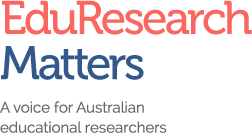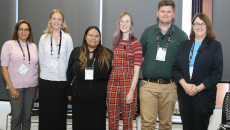In Australian higher education, equity is often measured through population parity—the idea that when enrolment numbers for a group reflect their proportion in the general population, equity has been achieved. But what happens when parity is achieved and equity status revoked? What if those numbers plateau or even decline, and the group quietly disappears from policy focus? This has happened to culturally and linguistically diverse doctoral candidates in the 2016 Australian Council of Learned Academies’ (ACOLA) Report on Australian doctoral education.
This is the central question we explored in our recent paper, Forgetting culturally diverse equity groups in Australian doctoral policy: what happens when population parity is reached? We use Nancy Fraser’s concept of “participatory parity” and Foucauldian discourse analysis to expose how culturally and linguistically diverse (CALD) domestic doctoral candidates have been effectively written out of Australia’s equity agenda.
A cue to disengage
The turning point, we argue, was the 2016 ACOLA Report, which noted that domestic candidates from culturally and linguistically diverse backgrounds had reached participation ratios above population parity. The ACOLA Report suggests that ‘participation by candidates from a non-English speaking background is good with ratios well above 1 for most of the reporting period but with a notable decline in the last two years’. After this comment, there is no further reporting or policy commentary on this group of doctoral candidates and very little concern that their numbers were actually declining.
But rather than celebrating this as a step forward and continuing the work of support and inclusion, policymakers took this as a cue to disengage. Subsequent reports and policy documents, including the 2024 Australian University Accord, no longer list CALD domestic doctoral candidates as a priority equity group.
This matters for several reasons.
First, it assumes cultural diversity is homogeneous and stable—that all CALD groups experience equal access, support, and outcomes. This is demonstrably false. The experiences of migrants, refugees, and ethnically diverse Australians differ widely. Participation data based on ‘language spoken at home’ is an inadequate proxy for cultural diversity. Yet this flawed metric continues to shape reporting and resourcing.
Second, declaring population parity ignores ongoing structural inequities, including racism, cultural misrecognition. It also ignores the dominance of Northern/Western knowledge systems in academia. There is nothing in the ACOLA Report, for example, that considers the cultural and linguistic knowledge and networks brought to Australian doctoral education by these candidates.
As we note, achieving numeric parity does not dismantle these barriers. The real danger is that when equity is reduced to counting heads, the deeper project of epistemic justice – the recognition and valuing of diverse cultural knowledges – is sidelined.
So, what can the sector and universities do?
We suggest reframing and a more nuanced understanding of parity. Specifically, we recommend adopting Fraser’s idea of participatory parity, which includes three dimensions: redistribution (economic fairness), recognition (cultural legitimacy), and representation (political voice). Participatory parity seeks to address concerns about cultural hierarchies and offers equal recognition for all cultures.
For CALD doctoral candidates, this means not only opening doors to enrolment but ensuring their knowledge systems, methodologies, and lived experiences are recognised and valued in research spaces.
In practical terms, this could involve:
- Restoring CALD domestic candidates as an equity group in national and institutional reporting
- Funding culturally responsive supervision and support programs
- Expanding doctoral scholarships and mentorships specifically designed for diverse cultural communities
- Embedding epistemic diversity into doctoral training and research assessment criteria.
Especially urgent
The insights in our paper are especially urgent at a time when Australian universities are under pressure to reimagine research training – often with an overwhelming focus on industry partnerships. As this shift accelerates, it is vital that we do not lose sight of equity and inclusion as foundational to the mission of higher education.
For outreach professionals and equity leaders, this is a call to action. Metrics matter, but only when they serve justice, not when they become a convenient endpoint. If our policy frameworks stop asking why disparities exist—and start assuming they’ve been solved—then we risk institutionalising silence where advocacy is needed most.
We must go beyond the numbers. Participatory parity offers a way to re-anchor equity in justice, culture, and voice. It’s time we brought CALD doctoral candidates back into view—not just as participants, but as powerful knowledge-makers in their own right.

Catherine Manathunga is professor of education research and co-director of the Indigenous and Transcultural Research Centre (ITRC) at the University of the Sunshine Coast (USC) . Jing Qi is a senior lecturer at RMIT University in the School of Global, Urban and Social Studies and the Social Equity Research Centre. Maria Raciti is a professor of marketing and co-director the of Indigenous and Transcultural Research Centre (ITRC) at the University of the Sunshine Coast







One thought on “When Numbers Deceive: Rethinking Equity for Culturally Diverse Doctoral Candidates”
Comments are closed.